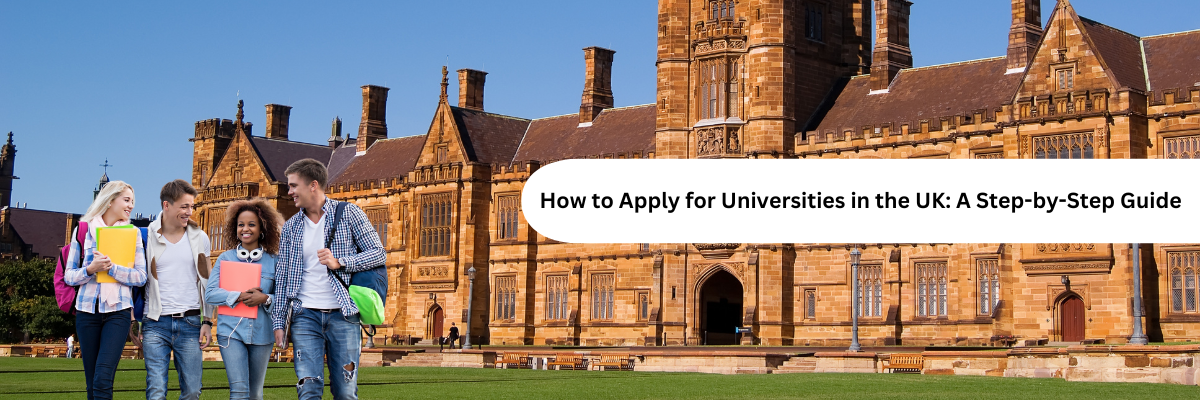13 Jul 2024 | How to Apply for Universities in the UK: A Step-by-Step Guide
0
76
Why Study in the UK?
Studying abroad is a dream for many students, and the UK is one of the most popular destinations for higher education. With its world-renowned universities and diverse cultural experiences, studying in the UK can be a life-changing opportunity. This guide will walk you through the steps to apply for UK universities, ensuring you have all the information you need for a successful application process.
Before diving into the application process, it’s important to understand why the UK is such a sought-after destination for international students.
Benefits of Studying in the UK
World-Class Education: The UK is home to some of the world’s top universities, known for their high academic standards and cutting-edge research.
Cultural Diversity: Studying in the UK offers the chance to experience a rich cultural environment, meeting people from all over the world.
Career Opportunities: A degree from a UK university is highly respected and can open doors to global career opportunities.
Step-by-Step Guide to Apply for UK Universities
1. Research and Choose Your Course
The first step in the UK university application process is to research and select the course you want to study. The UK offers a wide range of courses in various fields, so take the time to find the one that best suits your interests and career goals.
Tip: Use university websites and online course directories to gather information about different programs.
2. Check Entry Requirements
Each university and course may have specific entry requirements. These can include academic qualifications, English language proficiency, and other criteria.
Tip: Ensure you meet the entry requirements before applying to avoid unnecessary rejections.
3. Prepare Your Documents
Gather all the necessary documents required for your application. These typically include:
Academic Transcripts: Certified copies of your previous educational qualifications.
English Language Test Scores: IELTS or TOEFL scores to demonstrate English proficiency.
Personal Statement: A written statement outlining your motivations and suitability for the course.
Letters of Recommendation: References from teachers or employers.
Passport Copy: A copy of your valid passport.
4. Register with UCAS
The majority of undergraduate applications to UK universities are processed through UCAS (Universities and Colleges Admissions Service). Registering with UCAS is a crucial step in the application process.
Tip: Visit the UCAS website to create an account and familiarize yourself with the application system.
5. Complete Your UCAS Application
Fill out the UCAS application form, providing detailed information about your educational background, chosen courses, and personal details. You can apply to up to five universities or courses through UCAS.
Tip: Take your time to carefully complete each section of the application, ensuring all information is accurate.
6. Write a Strong Personal Statement
Your personal statement is a critical part of your application. It’s your chance to showcase your passion for the subject and explain why you are a suitable candidate for the course.
Tips for a Strong Personal Statement:
Be Authentic: Write in your own voice and be genuine about your motivations.
Highlight Achievements: Discuss relevant academic and extracurricular achievements.
Explain Your Interest: Clearly explain why you want to study the chosen course and how it aligns with your career goals.
7. Submit Your Application
Once you have completed your UCAS application and attached all required documents, review everything thoroughly before submitting. Pay attention to deadlines, as late applications may not be considered.
Tip: Submit your application well before the deadline to avoid any last-minute issues.
8. Attend Interviews (If Required)
Some courses or universities may require an interview as part of the selection process. If you are invited for an interview, prepare thoroughly by researching common visa interview questions and practicing your responses.
Tip: Dress professionally and be punctual for your interview, whether it’s in-person or online.
9. Await Offers
After submitting your application, you will need to wait for responses from the universities. UCAS will notify you of any offers received. Offers can be conditional (subject to meeting certain conditions) or unconditional.
Tip: Keep track of offer deadlines and respond promptly to secure your place.
10. Apply for a Student Visa
Once you receive an offer from a UK university, the next step is to apply for a student visa. You will need a Confirmation of Acceptance for Studies (CAS) from your chosen university to apply for the visa.
Tips for Visa Application:
Prepare Documents: Gather all necessary documents, including your CAS, passport, financial proof, and English language test scores.
Complete the Application: Fill out the online visa application form and pay the visa fee.
Attend Biometrics Appointment: Schedule and attend a biometrics appointment to provide your fingerprints and photograph.
Wait for Decision: Wait for the visa decision, which can take a few weeks.
Final Preparations for Studying Abroad
After securing your visa, there are a few more preparations to make before you start your study abroad journey:
1. Arrange Accommodation
Look for accommodation options near your university. Many universities offer on-campus housing, or you can find private rentals.
2. Plan Your Finances
Ensure you have enough funds to cover tuition fees, living expenses, and any additional costs. Open a UK bank account once you arrive to manage your finances more easily.
3. Pack Essentials
Pack essential items, including clothing, toiletries, and any academic materials you may need. Check airline restrictions for baggage allowance.
4. Prepare for Departure
Plan your travel arrangements, including booking flights and arranging airport transfers. Familiarize yourself with the local culture and customs to ease your transition.
Conclusion
Applying for universities in the UK is a detailed process that requires careful preparation and organization. By following this step-by-step guide, you can navigate the application process smoothly and increase your chances of securing a place at a top UK university. Studying abroad in the UK offers incredible academic and cultural opportunities, making it a worthwhile endeavor for your future.
For more assistance, please visit our study abroad consultancy services and explore our wide range of offerings for students interested in studying in the USA, studying in the UK, studying in Canada, studying in Australia, studying in Ireland, and many other countries.
Frequently Asked Questions
1. How early should I start preparing my application for UK universities?
Ans. Start at least a year in advance to ensure you have enough time to meet all requirements and deadlines.
2. What is the typical cost of applying to UK universities through UCAS?
Ans. The UCAS application fee is usually around £20 for a single choice or £26 for multiple choices.
3. Do all UK universities require an English language test?
Ans. Most universities require an English language test like IELTS or TOEFL unless you have previous education in English.
4. Can I apply to UK universities without using UCAS?
Ans. Some universities may accept direct applications, but most undergraduate applications go through UCAS.
5. How long does the student visa process take?
Ans. The student visa process can take a few weeks, so apply as soon as you receive your CAS.


